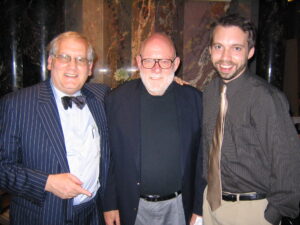In 1985, Fred and Donna J. Hawley, MSN, EdD, reported that remission in rheumatoid arthritis was seen in less than 2% of patients, at a time when textbooks of rheumatology suggested that remission was common in the treatment of rheumatoid arthritis.3 He and Dr. Hawley recognized that short-term clinical trials and research studies over one year were often not translated into long-term care over 2–10 years.

Dr. Pincus, Dr. Wolfe & Dr. Michaud
Fred was the first to report that methotrexate, a new drug used to treat rheumatoid arthritis in the 1980s, was associated with this significant improvement in mortality outcomes, a major advance for rheumatology patients.4
He was also one of the first doctors to define criteria for fibromyalgia, endorsed by the ACR in 1990.
Fred produced hundreds of research papers on these topics and his research has been cited more than 125,000 times, according to Google Scholar.5 (For more information about Fred’s role in establishing the National Data Bank for Rheumatic Diseases, see our story.)
Fred was an unusually generous and collaborative person. Early in our friendship in the 1980s, a discussion about depression in rheumatoid arthritis led us to analyze his patient results, which indicated that responses to many items in the Minnesota Multiphasic Personality Inventory, interpreted as indicating hypochondriasis, hysteria and depression, were driven by expected responses of individuals with somatic diseases.6 We were co-authors of more than 45 published reports and a book in 1994 to introduce new concepts concerning rheumatoid arthritis.7

Dr. Wolfe, Angelo Ravelli, Dr. Pincus
Fred co-authored publications with hundreds of rheumatologists, and shared his ideas, data and interpretations consistently over the years.
Comments from Dr. Michaud
“After I heard this bald and silver-bearded man yelling at the surgeon who cut your knee open and threw out what was inside, I knew you were in good hands!”
This remark from my grandmother about our initial encounter with Dr. Fred Wolfe in 1977—when he diagnosed me, a 3-year-old boy with a limp and swollen knee, with juvenile rheumatoid arthritis (JRA)—is one of many personal anecdotes from his distinctive and distinguished life.
He was first a rheumatologist: His notes showed genuine concern and thoughtfulness about his patients’ well-being, often hidden under a stern demeanor. He told me that after his two years in the Air Force that he wanted to stay in Wichita and found a spot by taking over a clinic for the sole rheumatologist. He said there was a lot less to learn back then.
